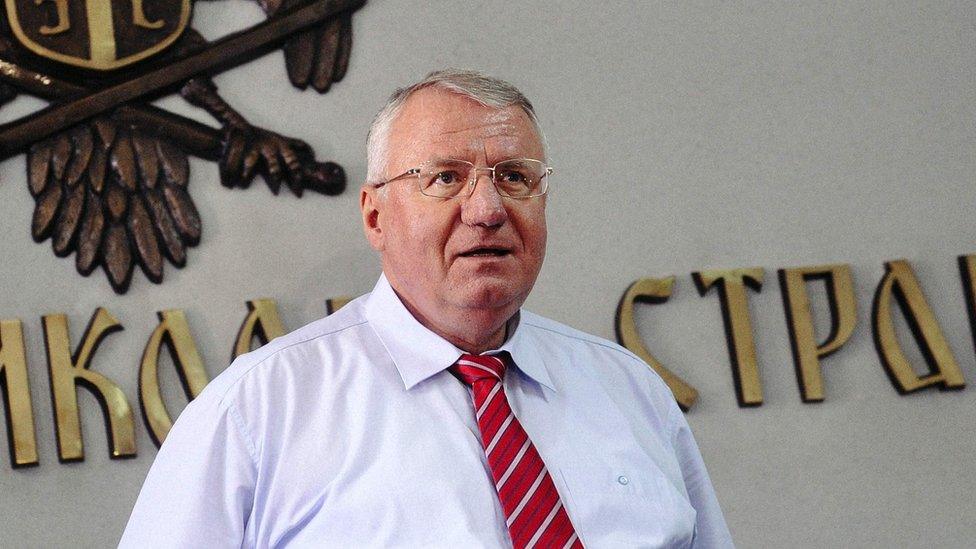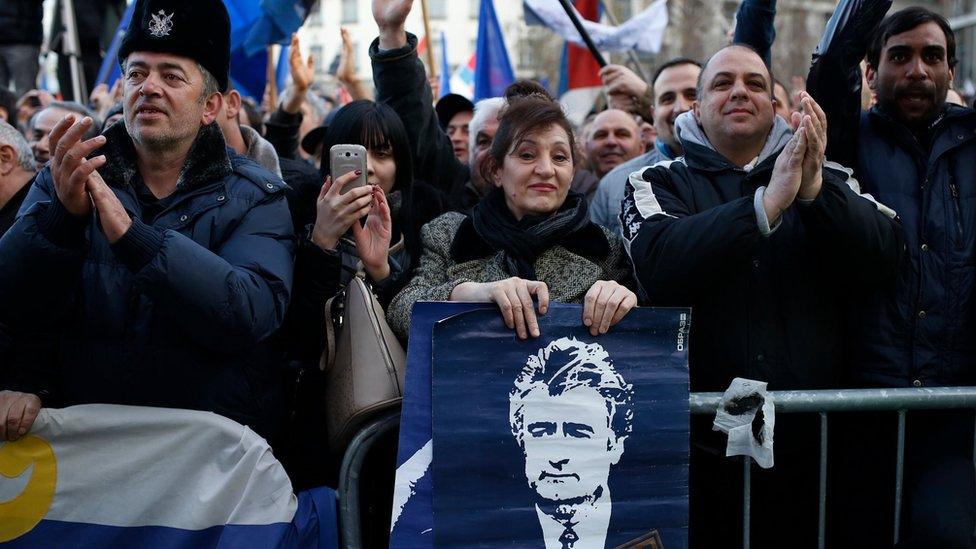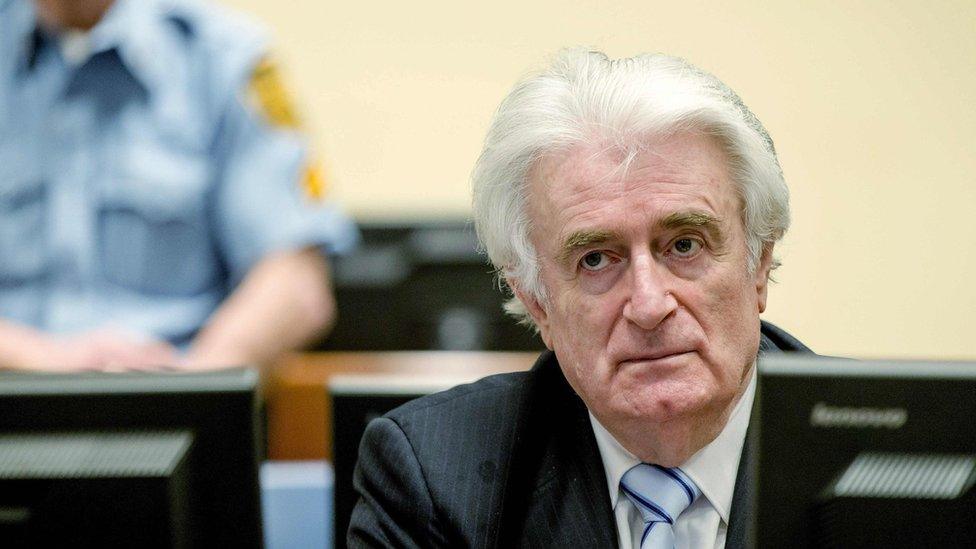Serbia radical Vojislav Seselj acquitted of Balkan war crimes
- Published

Seselj is the most high-profile Serb to be acquitted by the UN tribunal
Serbian ultra-nationalist Vojislav Seselj has been found not guilty of war crimes and crimes against humanity over the Balkan wars in the 1990s.
The UN war crimes court at The Hague said, external he had neither borne individual responsibility for the crimes, nor known about them nor endorsed them.
Mr Seselj had denied the charges. In his first reaction, he said the court had reached the only verdict possible.
But Croatia's prime minister condemned the verdict as "shameful".
The UN tribunal's prosecutor Serge Brammertz said his office would decide later whether to appeal.
"I'm absolutely convinced that the victims' communities and many people will not be satisfied with this outcome," Mr Brammertz said.

A fading force in Serbia: analysis by Guy Delauney, BBC News, Belgrade
It was billed as a landmark verdict for The Hague Tribunal but Vojislav Seselj was determined his day of judgement should be business as usual and his wish was granted.
He is not just a free man but available to act as the figurehead of his Radical Party in Serbia's forthcoming general election. The unrepentant ultra-nationalists hold rallies which feature fiery rhetoric and, frequently, burning of EU flags. The next such event, on the outskirts of Belgrade, will follow just hours on from the verdict. But there is little support for ultra-nationalism now and Vojislav Seselj's party will be happy just to gain a parliamentary seat in next month's vote, following an electoral wipe-out two years ago.
Journalist Dejan Anastasejovic, a long-standing critic of Mr Seselj, called the acquittal a "deeply flawed outcome of a deeply flawed process" but said there was now very little political support for Mr Seselj and his allies.
Serbia's Prime Minister Aleksandar Vucic said that "in political terms, this particular verdict could not have serious consequences for Serbia".
Vojislav Seselj - key moments
Youngest PhD holder in what is then Yugoslavia; teaches at Michigan and then at Sarajevo universities
Is jailed for two years in 1984 for advocating that Yugoslavia should be replaced with a Serb-dominated entity
Sets up Serbian Radical Party in 1990, elected MP a year later
Breaks with Slobodan Milosevic in 1993 over Bosnian peace plans
Becomes deputy prime minister in 1998 when the Kosovo atrocities escalate
Indicted by ICTY in 2003, surrenders voluntarily
Acquitted of all charges in 2016

Mr Seselj was allowed to go to Belgrade in 2014 after being diagnosed with cancer and was not present in the courtroom.
He had even refused the tribunal's offer to follow the verdict by video link
He has been taking part in anti-government rallies ahead of Serbian parliamentary elections in April.
Mr Seselj was a close ally of the late Serbian President, Slobodan Milosevic. He served as Serbian deputy prime minister from 1998 to 2000.
He surrendered to the UN court (the ICTY) voluntarily in 2003. When the ICTY sought to appoint a defence lawyer against his wishes, he went on hunger strike.

A Seselj supporter in Belgrade holds a placard of Radovan Karadzic - jailed by the tribunal last week

Vojislav Seselj charges
Deportation or forcible transfer of tens of thousands of Croat, Muslim and other non-Serb civilians in Bosnia-Herzegovina, Croatia and Serbia
Murder and deliberate destruction of homes, other public and private property, cultural institutions, historic monuments and sacred sites
Torture, beating, robbery, sexual assaults, and perpetuation of inhumane living conditions against Croat, Muslim and other non-Serb civilians by Serb soldiers during capture and in the detention facilities;
Direct and public denigration through "hate speech" of the Croat, Muslim and other non-Serb populations

The indictment , externalcharged him with three counts of crimes against humanity and six of war crimes for inciting ethnic cleansing in Croatia, Bosnia and the Serbian province of Vojvodina in the period August 1991-September 1993.
On the most serious charge of crimes against humanity, presiding Judge Jean-Claude Antonetti said the prosecution "had failed to prove beyond all reasonable doubt that there was a widespread and systematic attack against the non-Serb civilian population in large areas of Croatia and Bosnia.
"The evidence tendered and considered establishes instead that there was an armed conflict between enemy military forces with civilian components."
Prosecutors had argued Mr Seselj was criminally responsible for the murder, torture and deportation of non-Serbs as part of his project to create a "Greater Serbia".
They had accused him of raising an army of volunteers who committed "unspeakable crimes".
But the trial chamber found that there was no "criminal purpose in sending volunteers" - and, moreover, they had not been under Mr Seselj's command.
"The majority simply notes that it is not satisfied that the recruitment and subsequent deployment of volunteers implies that Vojislav Seselj knew of these crimes on the ground, or that he instructed or endorsed them," it said.
The verdict also concluded that the "Greater Serbia" plan Mr Seselj had supported was not a "criminal", but "political", project.
Croatian Prime Minister Tihomir Oreskovic criticised the outcome as "a defeat for the Hague tribunal and the prosecution".
Mr Seselj had consistently berated the tribunal, challenging its legitimacy - and regretting the fact that it could not pass a death sentence on him.
On Thursday, he said he wanted 14m euros (£11m; $16m) in compensation against the UN tribunal.
In 2014, the court decided to release him for treatment. Serbian doctors said at the time that he was suffering from cancer of the colon, which had spread to his liver.

Radovan Karadzic was the most senior former Bosnian Serb to be convicted
Since its establishment, the ICTY has indicted 161 persons.
Last week, it convicted former Bosnian Serb leader Radovan Karadzic of genocide and war crimes in the war in Bosnia. He was sentenced to 40 years in jail.
Gen Ratko Mladic, who commanded Bosnian Serb forces, is also awaiting his verdict at The Hague.